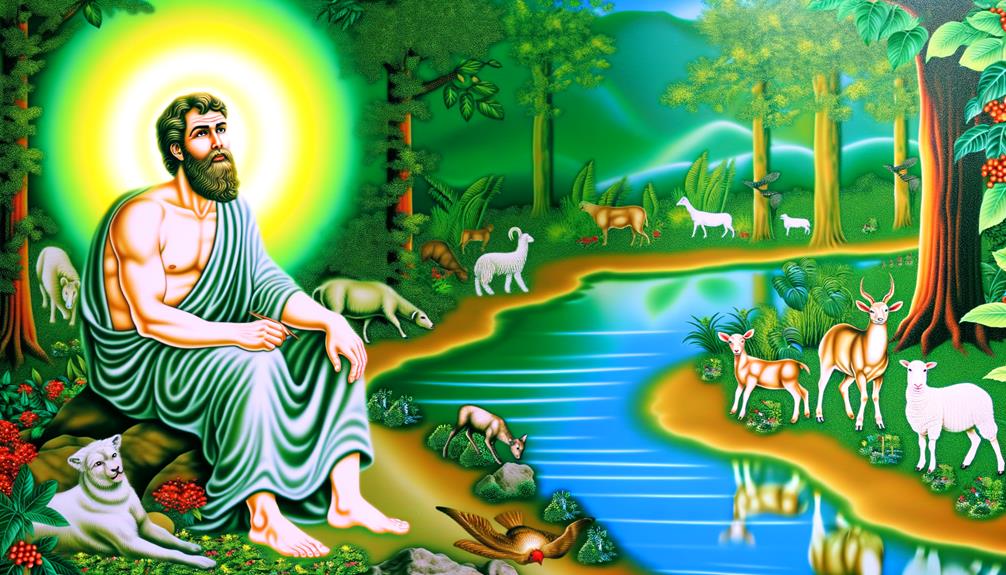Biblical Meaning of the Name Adam
The name Adam, derived from the Hebrew word 'adamah,' signifying 'ground' or 'earth,' reflects humanity's foundational link to the physical world. In the Genesis narrative, Adam's creation from the dust emphasizes his connection to the earth, symbolizing life and sustenance.
This bond highlights the theological and relational dimensions of human existence, underscoring responsibility towards creation and the divine imprint on humanity. Moreover, Adam's story invites contemplation on human identity, mortality, and the hope of redemption.
His narrative offers profound insights into the interconnectedness of life and the enduring quest for moral and spiritual coherence. Continue exploring to uncover more.

Key Takeaways
- The name Adam originates from the Hebrew word 'adamah,' meaning 'ground' or 'earth.'
- Adam symbolizes humanity's intrinsic connection to the earth and the physical world.
- In Genesis, Adam is fashioned from the dust, reflecting human mortality and divine creation.
- Adam represents the divine image ('Imago Dei') and human responsibility towards creation.
- Adam's narrative underscores moral responsibility and the possibility of redemption through divine grace.
Etymology of Adam
The etymology of the name 'Adam' traces its roots to the Hebrew word 'adamah,' which means 'ground' or 'earth,' reflecting a profound connection between humanity and the soil from which, according to biblical texts, the first man was formed.
This linguistic origin underscores a symbolic relationship, suggesting that humanity is intrinsically linked to the physical world.
The term 'adamah' is not merely a reference to physical substance but also carries connotations of life and sustenance, as the ground is a source of nourishment.
This etymological perspective provides a foundational understanding of human existence, emphasizing themes of origin, dependency, and the cyclical nature of life and death, rooted in the very earth that sustains life.
Adam in Genesis
Drawing from the etymological foundation, the account of Adam in the Book of Genesis presents a theological narrative that emphasizes his creation from the 'adamah' and his role as the progenitor of humanity. This foundational text underscores several key aspects:
- Creation: Adam is fashioned from the dust of the ground, symbolizing a profound connection between humanity and the earth.
- Divine Breath: God imparts life into Adam through His breath, signifying the divine origin of human life.
- Edenic Role: Adam is placed in the Garden of Eden to cultivate and keep it, highlighting stewardship.
- Companionship: The creation of Eve from Adam's rib emphasizes the relational aspect of human existence.
These elements collectively frame Adam's significance in the biblical narrative.
Symbolism of Earth
In biblical theology, the earth often symbolizes fertility, sustenance, and the intrinsic connection between humanity and creation. The name Adam, derived from the Hebrew word 'adamah,' meaning ground or earth, reflects this profound linkage.
The creation narrative in Genesis underscores this symbolism, portraying Adam as formed from the dust of the earth, highlighting humanity's dependence on and relationship with the soil. The earth is depicted as a source of life, providing nourishment and a place for human activity.
Fertility is also a key aspect, as the earth's ability to bring forth crops parallels human reproductive capabilities. This symbolism reinforces themes of interconnectedness and responsibility, portraying the earth as both a motherly figure and a reflection of divine creativity.
Theological Implications
Understanding the profound symbolism of earth in relation to the name Adam opens the way to exploring its theological implications, particularly how this connection shapes humanity's role and identity in biblical narratives.
Theologically, Adam's formation from the earth underscores several significant themes:
- Humanity's Origin: The creation of Adam from the soil signifies a divine intentionality in human existence, rooting humanity in the natural world.
- Stewardship: Adam's role in Eden highlights human responsibility towards creation, emphasizing stewardship and care.
- Mortality: The return to dust upon death reflects human mortality, acknowledging life's temporal nature.
- Divine Image: Despite earthly origins, Adam is imbued with the divine image, suggesting a unique relationship between humanity and God.
These elements collectively illustrate the intricate interplay between earth and divinity in biblical theology.
Adam and Human Identity
In the biblical narrative, Adam is not only depicted as the first human created by God, but also as the archetype of humanity itself. This dual role underscores Adam's significance in theological and anthropological contexts, serving as a foundational symbol of human identity and existential purpose.
Consequently, examining Adam's creation illuminates broader themes of human nature, morality, and the intrinsic connection between the individual and the divine.
Creation's First Human
Adam, as depicted in the Book of Genesis, stands as the archetype of humanity, embodying the foundational aspects of human identity and existence. His creation story provides profound insights into the nature of human beings, anchoring several pivotal elements of theological anthropology:
Divine Image: Adam is created in the 'Imago Dei', reflecting the divine image and establishing the inherent dignity and worth of human life.
Earthly Origin: Formed from the dust of the ground, Adam signifies humanity's connection to the earth and the material world.
Life's Breath: The divine breath bestowed upon Adam signifies the spiritual dimension of human existence.
Relational Being: Adam's need for companionship underscores the intrinsic relational aspect of human identity.
These elements collectively frame the biblical understanding of human ontology.
Symbol of Humanity
The figure of Adam serves as a profound symbol of humanity, encapsulating the essence of human identity and the existential realities faced by all people. Within the biblical narrative, Adam's creation from the dust and subsequent fall from grace reflect universal themes of origin, purpose, and moral fallibility.
His experience mirrors the collective human struggle with temptation, free will, and the quest for redemption. Adam's role as the progenitor of humankind signifies interconnectedness, emphasizing that all humans share a common ancestry and intrinsic worth.
Additionally, his story invites introspection on the human condition, urging reflection on the balance between divine intention and human agency. Therefore, Adam functions as a timeless metaphor for understanding human nature and its complexities.
Lessons From Adam
The narrative of Adam in the Bible provides profound insights into human existence, encapsulating themes of creation and responsibility, temptation and fall, and legacy and redemption.
By examining Adam's role in the Genesis account, one can discern essential ethical and existential lessons pertinent to human nature and divine expectations.
These lessons continue to resonate, offering timeless guidance on the human condition and the quest for moral integrity.
Creation and Responsibility
In examining the biblical narrative, one observes that Adam's creation and subsequent responsibilities provide profound insights into the theological understanding of human purpose and duty. The Book of Genesis positions Adam as the first human, created from the dust and imbued with the breath of life.
His responsibilities are manifold, reflecting divine mandates:
- Stewardship of Creation: Adam is tasked with cultivating and caring for the Garden of Eden.
- Naming of Creatures: He is given the authority to name all living beings, symbolizing dominion and relational understanding.
- Companionship: Eve is created as a helper, emphasizing human relationality and mutual support.
- Obedience to Divine Command: Adam's existence underscores the importance of adhering to God's directives, setting a paradigmatic precedent for human conduct.
Temptation and Fall
Adam's responsibilities, laden with divine trust, soon encounter a pivotal moment of testing through temptation, leading to the profound theological implications of the Fall.
In Genesis, the serpent's cunning persuasion targets Eve, but Adam's complicity is equally vital. The act of eating the forbidden fruit symbolizes disobedience and mistrust in God's command, precipitating humanity's estrangement from divine grace.
This narrative underscores the gravity of free will and moral choice, reflecting on human vulnerability to sin. The Fall not only introduces mortality and suffering but also reshapes the human condition, emphasizing the existential struggle between obedience and temptation.
Adam's experience serves as a foundational lesson in understanding the complexities of human nature and divine expectation.
Legacy and Redemption
While the narrative of Adam's fall illuminates human susceptibility to sin, his legacy also encompasses profound themes of redemption and the potential for restoration.
Analyzing Adam's story offers several critical insights:
- Human Imperfection: Adam's failure underscores the inherent imperfection within humanity, prompting a need for divine grace.
- Consequences and Grace: Despite the severe consequences of Adam's actions, divine grace is evident, as God provides garments and promises future redemption.
- Symbol of Hope: Adam's life is a precursor to the hope found in the New Agreement, where Christ is seen as the 'second Adam' who restores what was lost.
- Moral Responsibility: Adam's story encourages a deeper understanding of human moral responsibility and the enduring possibility of redemption through repentance.
These elements collectively offer valuable lessons on human nature and divine mercy.
Conclusion
In sum, the name Adam, rich in etymological and theological significance, serves as a foundational element in understanding human identity and existence within a biblical context. In the biblical narrative, Adam represents the first man and the archetype of humanity, embodying both the potential for greatness and the tendency towards sin. From a biblical perspective on the name Patrick, it is clear that names carry deep meaning and significance in shaping the understanding of human identity and purpose. Just as Adam’s name reflects his role as the first human, Patrick’s name also holds theological and historical significance that shapes how he is understood within a biblical context.
By examining Adam's creation from the earth, one is prompted to contemplate the profound relationship between humanity and the natural world.
What deeper truths about human nature and divine intention can be gleaned from Adam's narrative? Reflecting on Adam's lessons offers invaluable insights into human purpose and spiritual development.






